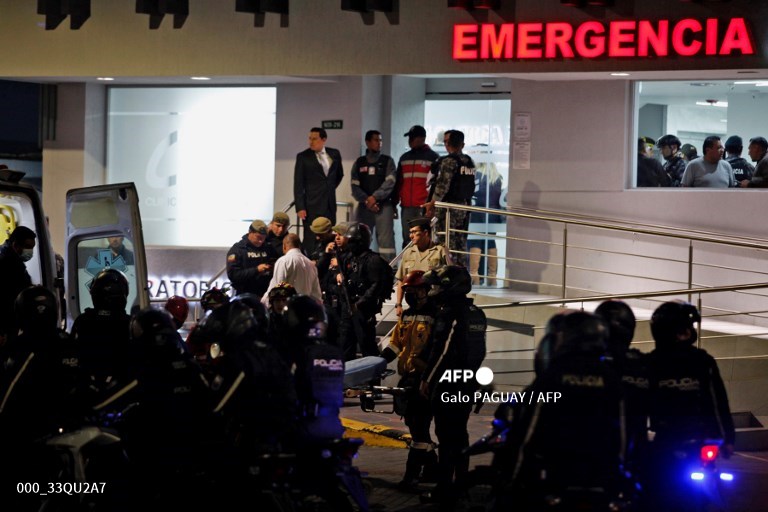Ecuador was under a state of emergency Thursday after the assassination of a popular presidential candidate just days before an election dominated by concerns over the once-peaceful country’s descent into brutal violence linked to drug trafficking.
Fernando Villavicencio, a 59-year-old journalist, and anti-corruption crusader, was killed in a hail of machine gun fire as he left a campaign rally in the capital Quito.
His supporters sprinted away or threw themselves to the floor as the shots rang out in the latest episode of shocking violence in the South American country, which has seen its murder rate soar amid bloody turf wars between drug gangs.
Villavicencio had complained of receiving threats, which have also targeted electoral officials in a tense campaign ahead of the snap election on August 20. A popular mayor and aspiring lawmaker have also been assassinated in recent weeks.
President Guillermo Lasso declared a two-month state of emergency, which will allow soldiers to patrol the streets. He had already in July declared targeted states of emergency in some towns gripped by violence.
In a social media post, he said he was “outraged and shocked” by the killing he blamed on “organized crime.”
“This crime will not go unpunished,” said Lasso.
Lasso also declared three days of national mourning, and other presidential candidates suspended their campaigns.
“This is a political crime … and we do not doubt that this murder is an attempt to sabotage the electoral process,” said Lasso.
Lasso, who took office in 2021, called the snap election after he dissolved the opposition-dominated Congress in May to avoid an impeachment trial. He is not seeking reelection.
Villavicencio was the second most popular of eight candidates in the presidential race, according to recent opinion polls.
The United States condemned a “brazen act of violence and assault on Ecuador’s democracy.”
The European Union’s foreign policy chief Josep Borrell said the bloc “stands with Ecuador in its fight against the worsening violence by organized crime.”
They ambushed him
Villavicencio was a fierce anti-corruption crusader, whose journalistic investigations exposed a vast graft network which led to former president Rafael Correa being sentenced to eight years in prison.
In an election campaign dominated by anxieties over security, he had pledged to build a maximum security prison in the Amazon to deal with the country’s rise in violence.
Carlos Figueroa, a friend of Villavicencio who was with him at the time of the attack, told local media that the assailants fired around 30 shots.
“They ambushed him outside” the sports center where the rally was taking place, Figueroa said. “Some (of those present) even thought they were fireworks.”
The country’s main newspaper, El Universo, reported that Villavicencio was assassinated “hitman-style and with three shots to the head.”
Nine other people were injured in the attack, including a candidate running for the national legislature and two policemen, prosecutors said.
One of the alleged attackers was shot and killed by security personnel, and six people have been arrested.
A video of a group of armed men, hooded and dressed in black, circulated on the internet, with the men claiming responsibility for the assassination — without mentioning Villavicencio — and claiming to be from the Los Lobos gang.
Its origin could not be verified by AFP, and security experts warned it may be an effort to manipulate the details of the crime.
Very hurt and very worried
National Court of Justice president Ivan Saquicela called Villavicencio’s murder “very painful for the country.”
“I am very hurt and very worried about Ecuador,” he said.
In September last year, the United States listed Ecuador among the top 22 drug-producing or transit countries in the world.
Ecuador is not known to have large plantations of drug crops or laboratories for refining cocaine.
Instead, the country — wedged between major cocaine producers Colombia and Peru — has become a staging ground for a foreign mafia, upping the stakes for local gangs who are brutally killing each other as they seek control of drug routes.
Its major port Guayaquil, from where most of the drugs are shipped abroad — often in containers of bananas or in legal shipments by front companies — is seen as having weaker controls.
In 2022, Ecuador’s murder rate almost doubled compared to the previous year to 25 per 100,000, a figure experts say will increase to 40 this year.
The country has seized about 530 tons of narcotics since 2021, according to official figures. Prison violence between gangs has left more than 430 dead in the same period, according to an AFP count.
